Unilever in the 21st Century: External Analysis and Adaptations
VerifiedAdded on 2023/06/17
|9
|1949
|165
Report
AI Summary
This report provides an analysis of Unilever's business environment in the 21st century, focusing on how the company adapts to external changes. It begins with an overview of Unilever, highlighting its global presence and key statistics. The report then examines the impact of the external environment on the business, utilizing PESTLE analysis to evaluate political, economic, social, technological, legal, and environmental factors. It identifies opportunities and threats faced by Unilever over the past three years, including environmental concerns, the COVID-19 pandemic, and the rise of digital technology. Finally, the report discusses Unilever's responses to these challenges, such as embracing sustainability, ensuring employee safety during the pandemic, and leveraging digital marketing strategies. The analysis concludes that Unilever's proactive adaptation to market changes has been crucial to its continued success.
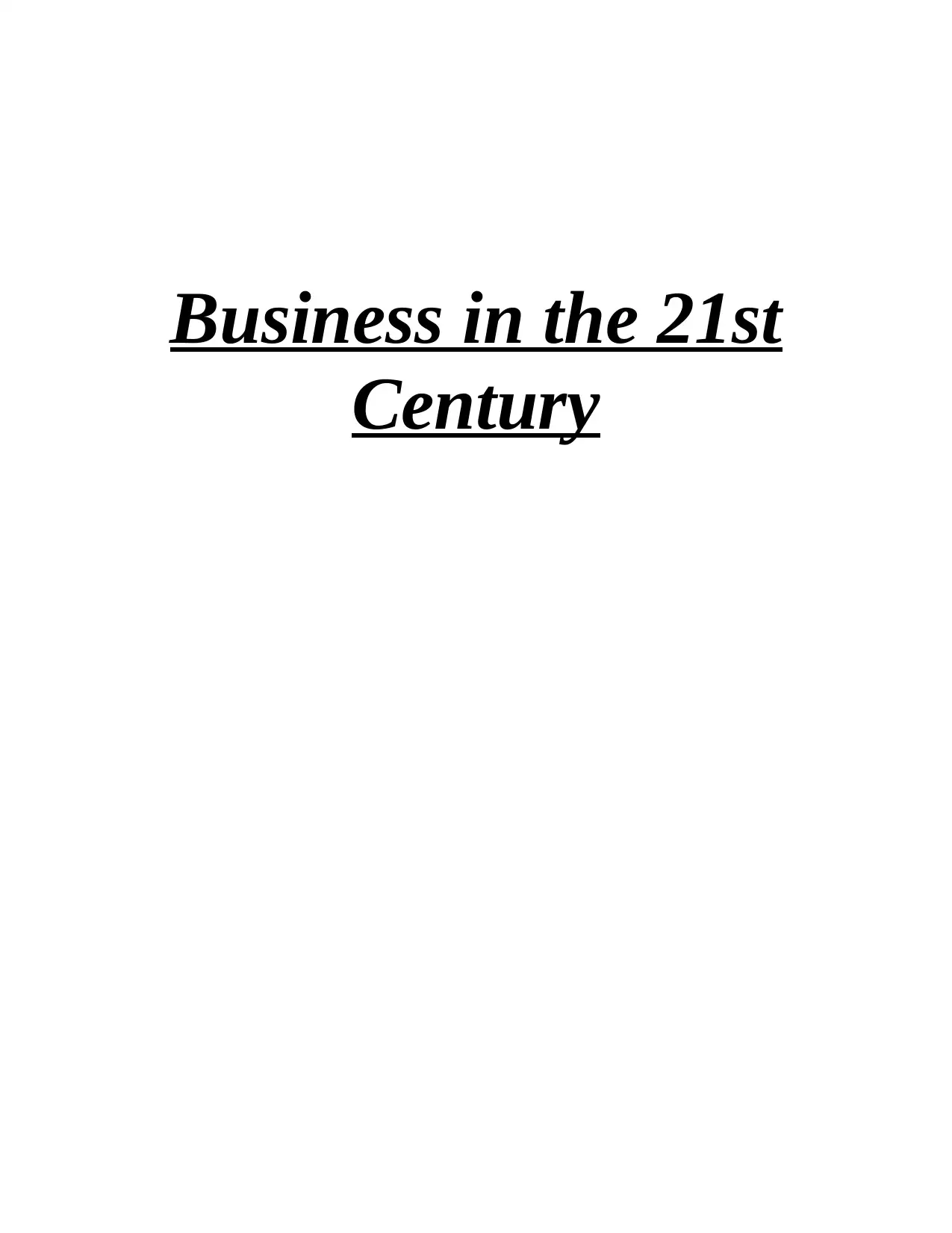
Business in the 21st
Century
Century
Paraphrase This Document
Need a fresh take? Get an instant paraphrase of this document with our AI Paraphraser
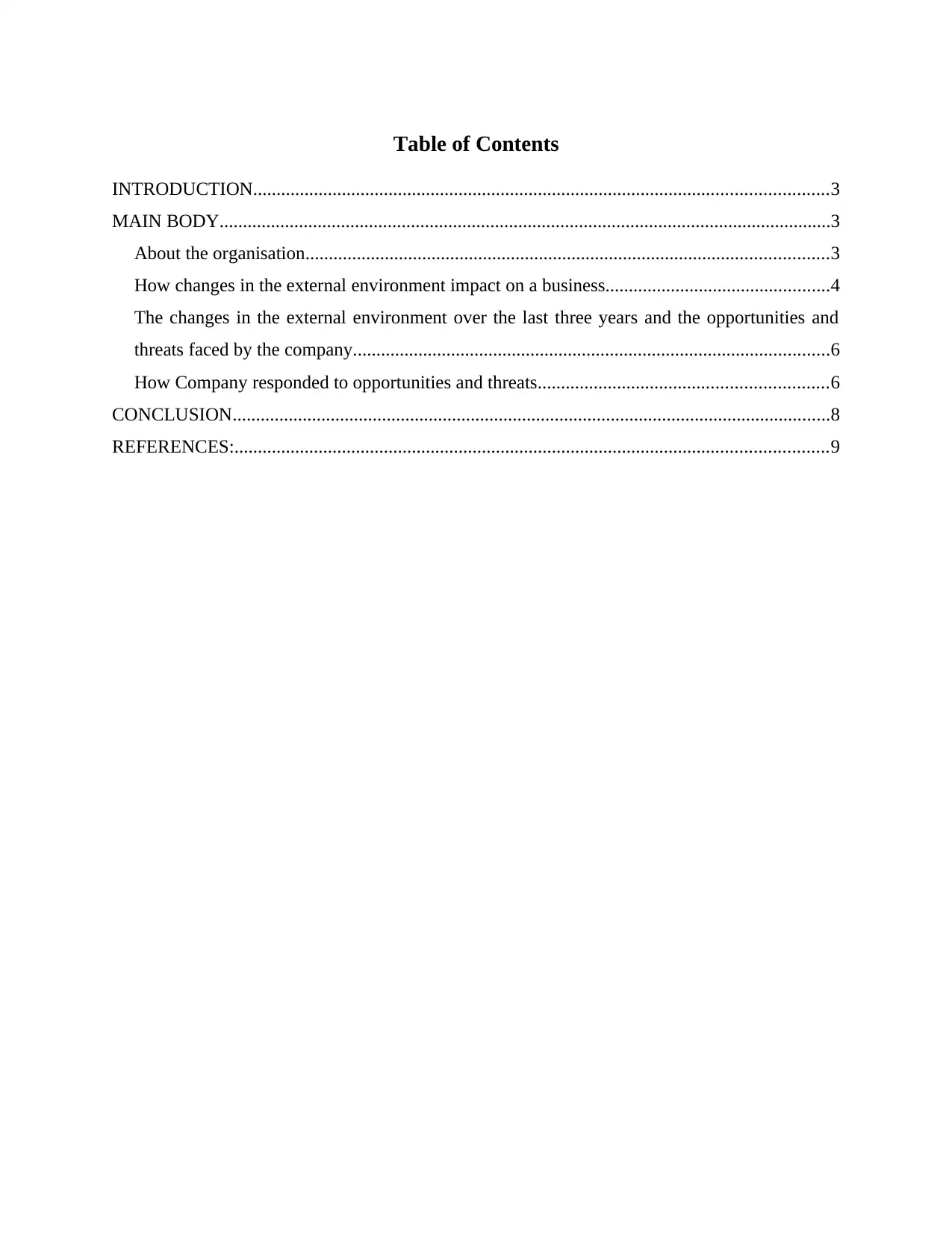
Table of Contents
INTRODUCTION...........................................................................................................................3
MAIN BODY...................................................................................................................................3
About the organisation................................................................................................................3
How changes in the external environment impact on a business................................................4
The changes in the external environment over the last three years and the opportunities and
threats faced by the company......................................................................................................6
How Company responded to opportunities and threats..............................................................6
CONCLUSION................................................................................................................................8
REFERENCES:...............................................................................................................................9
INTRODUCTION...........................................................................................................................3
MAIN BODY...................................................................................................................................3
About the organisation................................................................................................................3
How changes in the external environment impact on a business................................................4
The changes in the external environment over the last three years and the opportunities and
threats faced by the company......................................................................................................6
How Company responded to opportunities and threats..............................................................6
CONCLUSION................................................................................................................................8
REFERENCES:...............................................................................................................................9
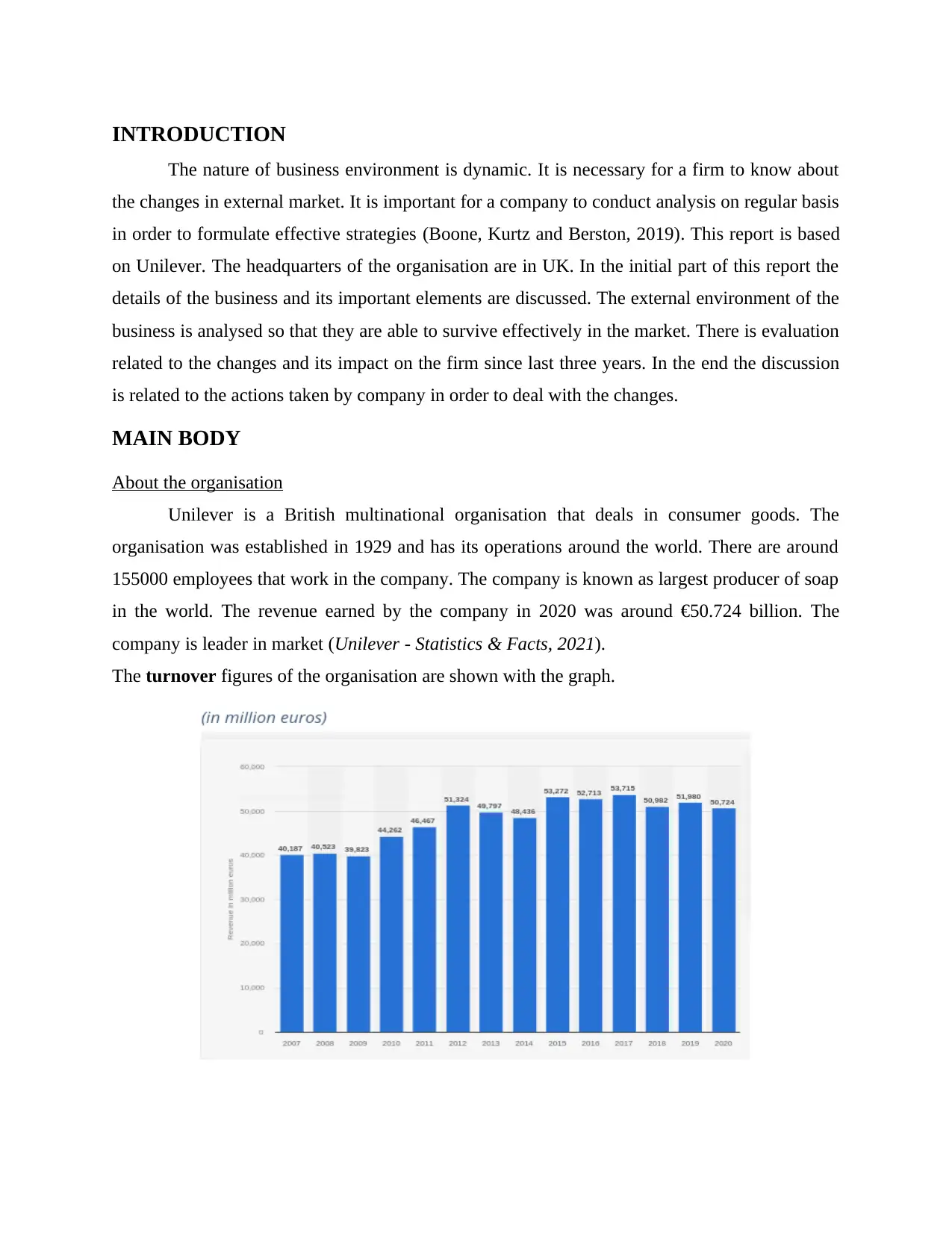
INTRODUCTION
The nature of business environment is dynamic. It is necessary for a firm to know about
the changes in external market. It is important for a company to conduct analysis on regular basis
in order to formulate effective strategies (Boone, Kurtz and Berston, 2019). This report is based
on Unilever. The headquarters of the organisation are in UK. In the initial part of this report the
details of the business and its important elements are discussed. The external environment of the
business is analysed so that they are able to survive effectively in the market. There is evaluation
related to the changes and its impact on the firm since last three years. In the end the discussion
is related to the actions taken by company in order to deal with the changes.
MAIN BODY
About the organisation
Unilever is a British multinational organisation that deals in consumer goods. The
organisation was established in 1929 and has its operations around the world. There are around
155000 employees that work in the company. The company is known as largest producer of soap
in the world. The revenue earned by the company in 2020 was around €50.724 billion. The
company is leader in market (Unilever - Statistics & Facts, 2021).
The turnover figures of the organisation are shown with the graph.
The nature of business environment is dynamic. It is necessary for a firm to know about
the changes in external market. It is important for a company to conduct analysis on regular basis
in order to formulate effective strategies (Boone, Kurtz and Berston, 2019). This report is based
on Unilever. The headquarters of the organisation are in UK. In the initial part of this report the
details of the business and its important elements are discussed. The external environment of the
business is analysed so that they are able to survive effectively in the market. There is evaluation
related to the changes and its impact on the firm since last three years. In the end the discussion
is related to the actions taken by company in order to deal with the changes.
MAIN BODY
About the organisation
Unilever is a British multinational organisation that deals in consumer goods. The
organisation was established in 1929 and has its operations around the world. There are around
155000 employees that work in the company. The company is known as largest producer of soap
in the world. The revenue earned by the company in 2020 was around €50.724 billion. The
company is leader in market (Unilever - Statistics & Facts, 2021).
The turnover figures of the organisation are shown with the graph.
⊘ This is a preview!⊘
Do you want full access?
Subscribe today to unlock all pages.

Trusted by 1+ million students worldwide
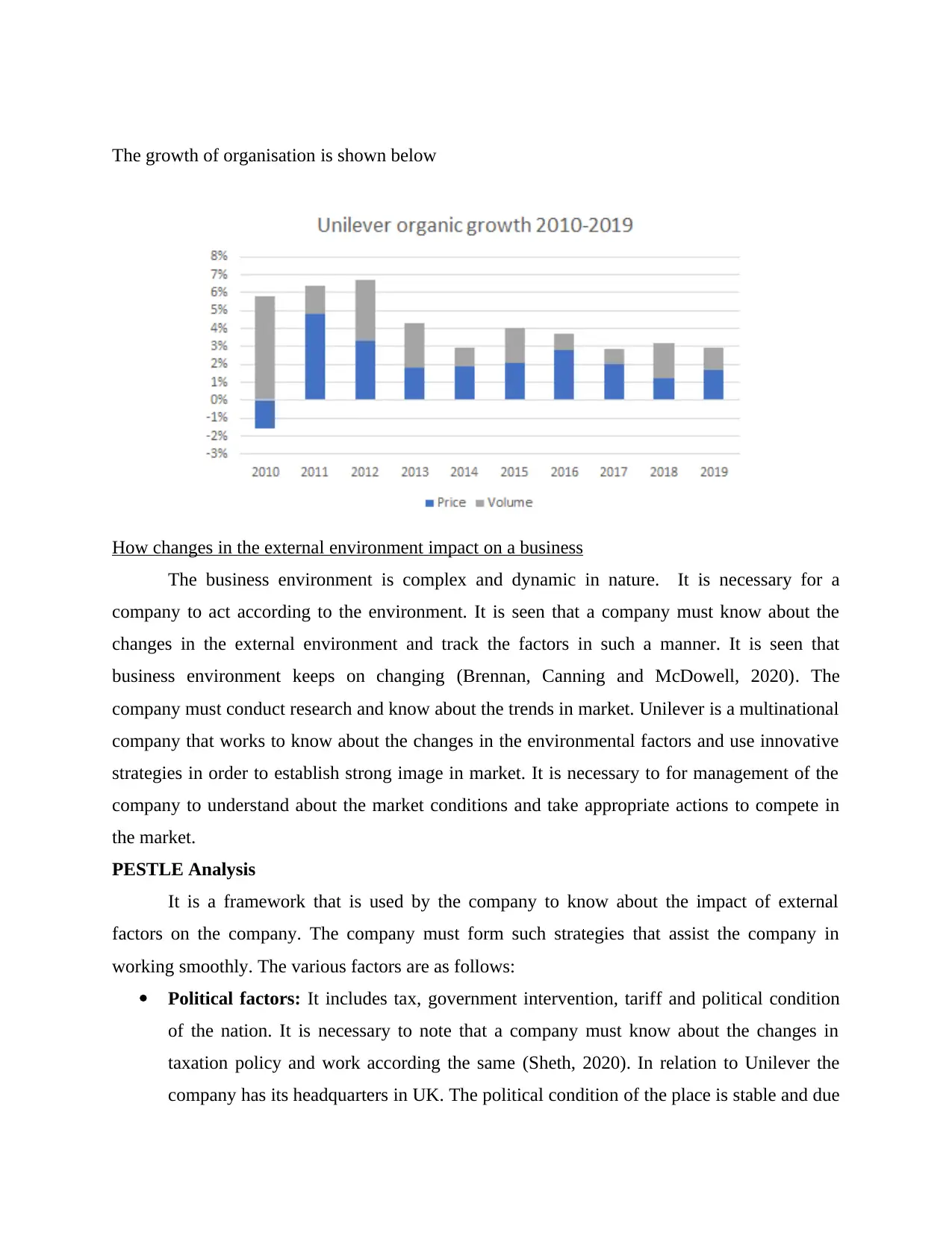
The growth of organisation is shown below
How changes in the external environment impact on a business
The business environment is complex and dynamic in nature. It is necessary for a
company to act according to the environment. It is seen that a company must know about the
changes in the external environment and track the factors in such a manner. It is seen that
business environment keeps on changing (Brennan, Canning and McDowell, 2020). The
company must conduct research and know about the trends in market. Unilever is a multinational
company that works to know about the changes in the environmental factors and use innovative
strategies in order to establish strong image in market. It is necessary to for management of the
company to understand about the market conditions and take appropriate actions to compete in
the market.
PESTLE Analysis
It is a framework that is used by the company to know about the impact of external
factors on the company. The company must form such strategies that assist the company in
working smoothly. The various factors are as follows:
Political factors: It includes tax, government intervention, tariff and political condition
of the nation. It is necessary to note that a company must know about the changes in
taxation policy and work according the same (Sheth, 2020). In relation to Unilever the
company has its headquarters in UK. The political condition of the place is stable and due
How changes in the external environment impact on a business
The business environment is complex and dynamic in nature. It is necessary for a
company to act according to the environment. It is seen that a company must know about the
changes in the external environment and track the factors in such a manner. It is seen that
business environment keeps on changing (Brennan, Canning and McDowell, 2020). The
company must conduct research and know about the trends in market. Unilever is a multinational
company that works to know about the changes in the environmental factors and use innovative
strategies in order to establish strong image in market. It is necessary to for management of the
company to understand about the market conditions and take appropriate actions to compete in
the market.
PESTLE Analysis
It is a framework that is used by the company to know about the impact of external
factors on the company. The company must form such strategies that assist the company in
working smoothly. The various factors are as follows:
Political factors: It includes tax, government intervention, tariff and political condition
of the nation. It is necessary to note that a company must know about the changes in
taxation policy and work according the same (Sheth, 2020). In relation to Unilever the
company has its headquarters in UK. The political condition of the place is stable and due
Paraphrase This Document
Need a fresh take? Get an instant paraphrase of this document with our AI Paraphraser
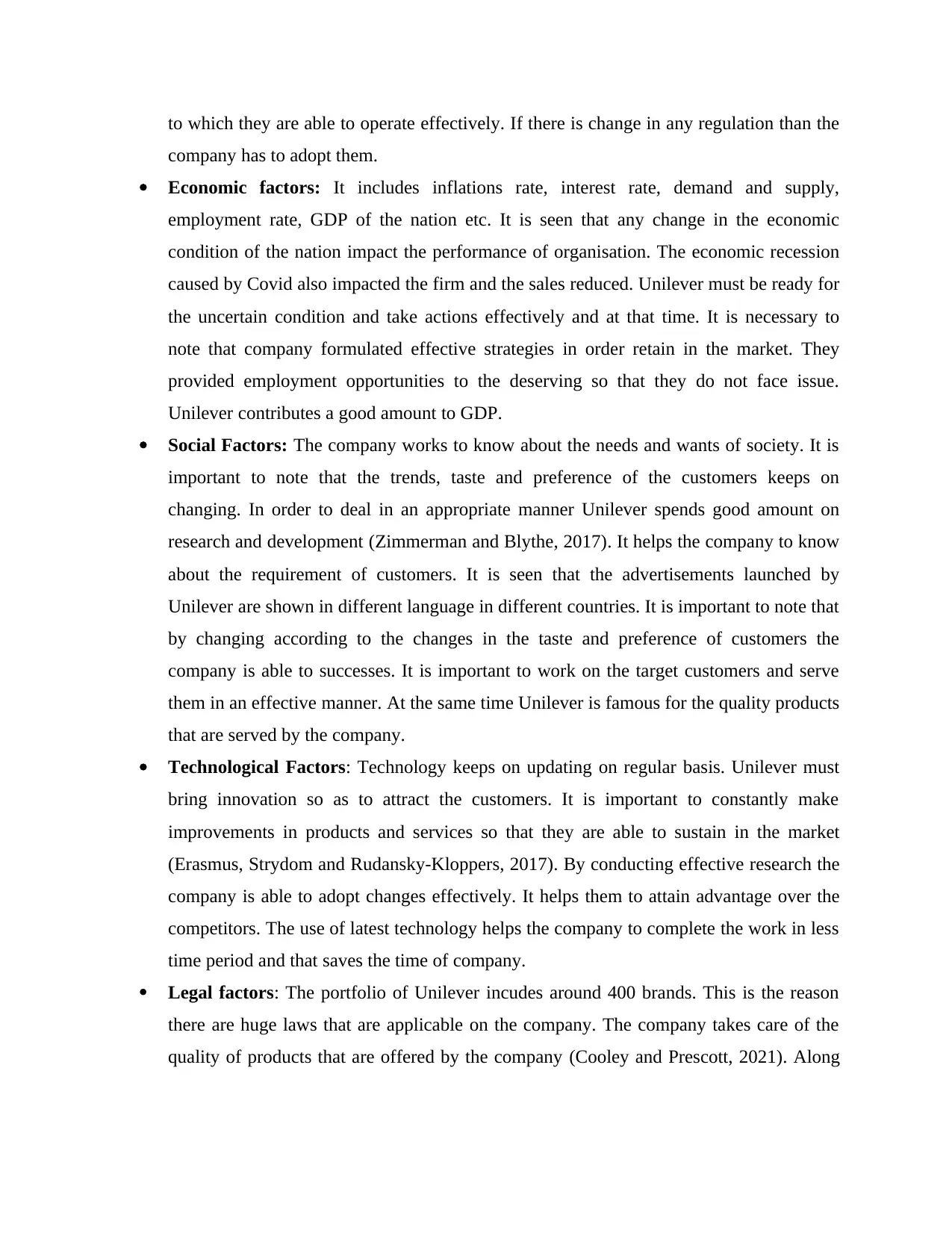
to which they are able to operate effectively. If there is change in any regulation than the
company has to adopt them.
Economic factors: It includes inflations rate, interest rate, demand and supply,
employment rate, GDP of the nation etc. It is seen that any change in the economic
condition of the nation impact the performance of organisation. The economic recession
caused by Covid also impacted the firm and the sales reduced. Unilever must be ready for
the uncertain condition and take actions effectively and at that time. It is necessary to
note that company formulated effective strategies in order retain in the market. They
provided employment opportunities to the deserving so that they do not face issue.
Unilever contributes a good amount to GDP.
Social Factors: The company works to know about the needs and wants of society. It is
important to note that the trends, taste and preference of the customers keeps on
changing. In order to deal in an appropriate manner Unilever spends good amount on
research and development (Zimmerman and Blythe, 2017). It helps the company to know
about the requirement of customers. It is seen that the advertisements launched by
Unilever are shown in different language in different countries. It is important to note that
by changing according to the changes in the taste and preference of customers the
company is able to successes. It is important to work on the target customers and serve
them in an effective manner. At the same time Unilever is famous for the quality products
that are served by the company.
Technological Factors: Technology keeps on updating on regular basis. Unilever must
bring innovation so as to attract the customers. It is important to constantly make
improvements in products and services so that they are able to sustain in the market
(Erasmus, Strydom and Rudansky-Kloppers, 2017). By conducting effective research the
company is able to adopt changes effectively. It helps them to attain advantage over the
competitors. The use of latest technology helps the company to complete the work in less
time period and that saves the time of company.
Legal factors: The portfolio of Unilever incudes around 400 brands. This is the reason
there are huge laws that are applicable on the company. The company takes care of the
quality of products that are offered by the company (Cooley and Prescott, 2021). Along
company has to adopt them.
Economic factors: It includes inflations rate, interest rate, demand and supply,
employment rate, GDP of the nation etc. It is seen that any change in the economic
condition of the nation impact the performance of organisation. The economic recession
caused by Covid also impacted the firm and the sales reduced. Unilever must be ready for
the uncertain condition and take actions effectively and at that time. It is necessary to
note that company formulated effective strategies in order retain in the market. They
provided employment opportunities to the deserving so that they do not face issue.
Unilever contributes a good amount to GDP.
Social Factors: The company works to know about the needs and wants of society. It is
important to note that the trends, taste and preference of the customers keeps on
changing. In order to deal in an appropriate manner Unilever spends good amount on
research and development (Zimmerman and Blythe, 2017). It helps the company to know
about the requirement of customers. It is seen that the advertisements launched by
Unilever are shown in different language in different countries. It is important to note that
by changing according to the changes in the taste and preference of customers the
company is able to successes. It is important to work on the target customers and serve
them in an effective manner. At the same time Unilever is famous for the quality products
that are served by the company.
Technological Factors: Technology keeps on updating on regular basis. Unilever must
bring innovation so as to attract the customers. It is important to constantly make
improvements in products and services so that they are able to sustain in the market
(Erasmus, Strydom and Rudansky-Kloppers, 2017). By conducting effective research the
company is able to adopt changes effectively. It helps them to attain advantage over the
competitors. The use of latest technology helps the company to complete the work in less
time period and that saves the time of company.
Legal factors: The portfolio of Unilever incudes around 400 brands. This is the reason
there are huge laws that are applicable on the company. The company takes care of the
quality of products that are offered by the company (Cooley and Prescott, 2021). Along
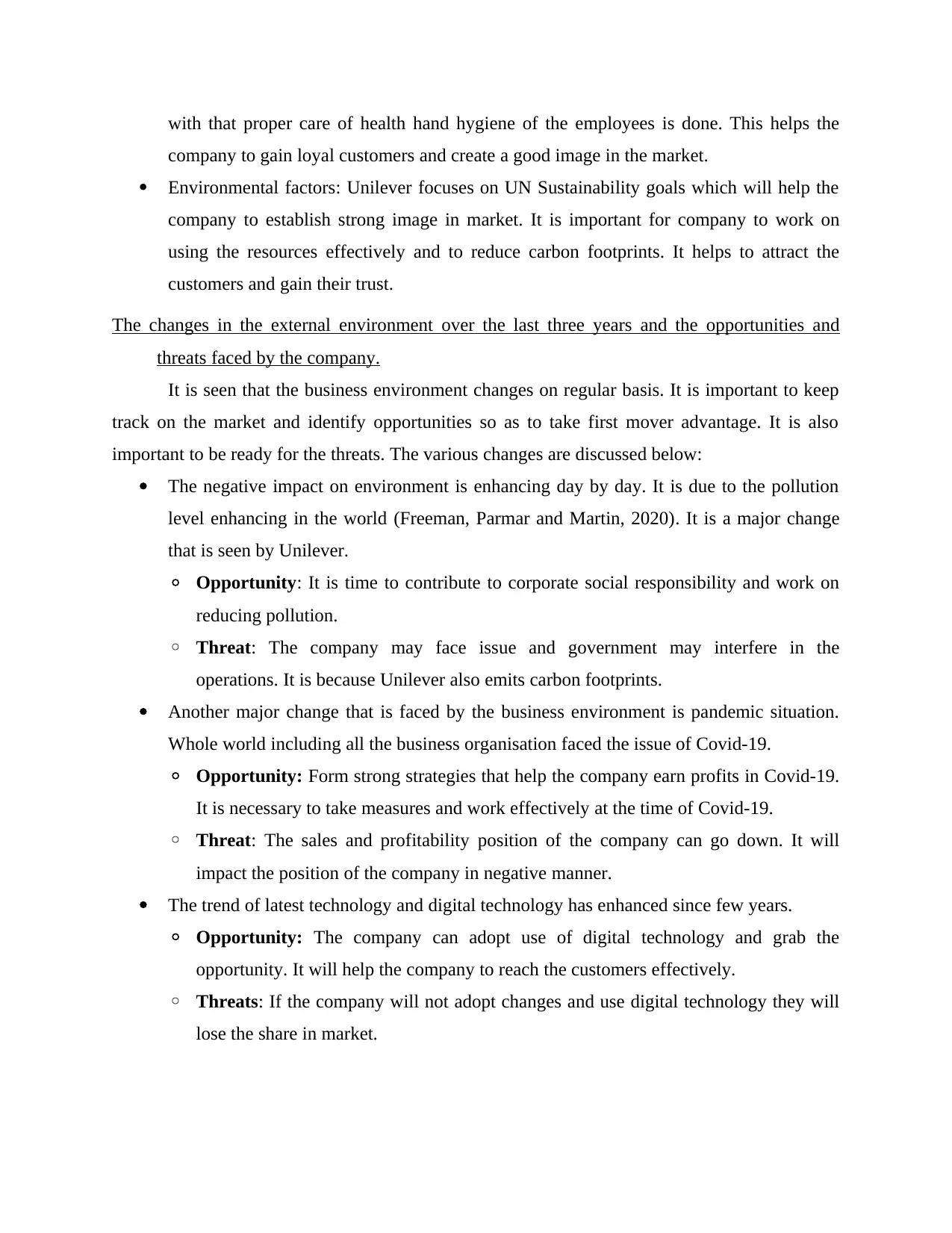
with that proper care of health hand hygiene of the employees is done. This helps the
company to gain loyal customers and create a good image in the market.
Environmental factors: Unilever focuses on UN Sustainability goals which will help the
company to establish strong image in market. It is important for company to work on
using the resources effectively and to reduce carbon footprints. It helps to attract the
customers and gain their trust.
The changes in the external environment over the last three years and the opportunities and
threats faced by the company.
It is seen that the business environment changes on regular basis. It is important to keep
track on the market and identify opportunities so as to take first mover advantage. It is also
important to be ready for the threats. The various changes are discussed below:
The negative impact on environment is enhancing day by day. It is due to the pollution
level enhancing in the world (Freeman, Parmar and Martin, 2020). It is a major change
that is seen by Unilever.
◦ Opportunity: It is time to contribute to corporate social responsibility and work on
reducing pollution.
◦ Threat: The company may face issue and government may interfere in the
operations. It is because Unilever also emits carbon footprints.
Another major change that is faced by the business environment is pandemic situation.
Whole world including all the business organisation faced the issue of Covid-19.
◦ Opportunity: Form strong strategies that help the company earn profits in Covid-19.
It is necessary to take measures and work effectively at the time of Covid-19.
◦ Threat: The sales and profitability position of the company can go down. It will
impact the position of the company in negative manner.
The trend of latest technology and digital technology has enhanced since few years.
◦ Opportunity: The company can adopt use of digital technology and grab the
opportunity. It will help the company to reach the customers effectively.
◦ Threats: If the company will not adopt changes and use digital technology they will
lose the share in market.
company to gain loyal customers and create a good image in the market.
Environmental factors: Unilever focuses on UN Sustainability goals which will help the
company to establish strong image in market. It is important for company to work on
using the resources effectively and to reduce carbon footprints. It helps to attract the
customers and gain their trust.
The changes in the external environment over the last three years and the opportunities and
threats faced by the company.
It is seen that the business environment changes on regular basis. It is important to keep
track on the market and identify opportunities so as to take first mover advantage. It is also
important to be ready for the threats. The various changes are discussed below:
The negative impact on environment is enhancing day by day. It is due to the pollution
level enhancing in the world (Freeman, Parmar and Martin, 2020). It is a major change
that is seen by Unilever.
◦ Opportunity: It is time to contribute to corporate social responsibility and work on
reducing pollution.
◦ Threat: The company may face issue and government may interfere in the
operations. It is because Unilever also emits carbon footprints.
Another major change that is faced by the business environment is pandemic situation.
Whole world including all the business organisation faced the issue of Covid-19.
◦ Opportunity: Form strong strategies that help the company earn profits in Covid-19.
It is necessary to take measures and work effectively at the time of Covid-19.
◦ Threat: The sales and profitability position of the company can go down. It will
impact the position of the company in negative manner.
The trend of latest technology and digital technology has enhanced since few years.
◦ Opportunity: The company can adopt use of digital technology and grab the
opportunity. It will help the company to reach the customers effectively.
◦ Threats: If the company will not adopt changes and use digital technology they will
lose the share in market.
⊘ This is a preview!⊘
Do you want full access?
Subscribe today to unlock all pages.

Trusted by 1+ million students worldwide
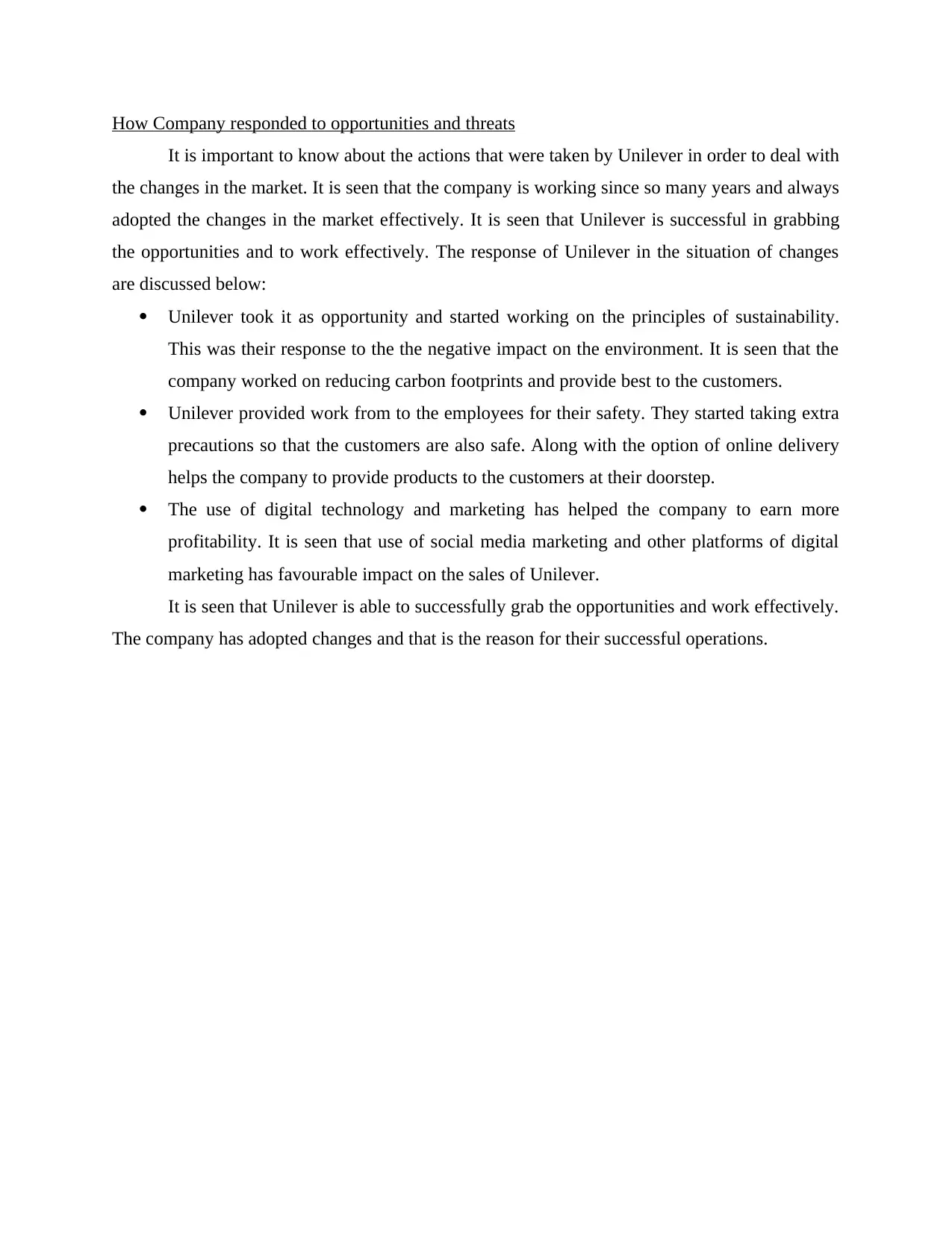
How Company responded to opportunities and threats
It is important to know about the actions that were taken by Unilever in order to deal with
the changes in the market. It is seen that the company is working since so many years and always
adopted the changes in the market effectively. It is seen that Unilever is successful in grabbing
the opportunities and to work effectively. The response of Unilever in the situation of changes
are discussed below:
Unilever took it as opportunity and started working on the principles of sustainability.
This was their response to the the negative impact on the environment. It is seen that the
company worked on reducing carbon footprints and provide best to the customers.
Unilever provided work from to the employees for their safety. They started taking extra
precautions so that the customers are also safe. Along with the option of online delivery
helps the company to provide products to the customers at their doorstep.
The use of digital technology and marketing has helped the company to earn more
profitability. It is seen that use of social media marketing and other platforms of digital
marketing has favourable impact on the sales of Unilever.
It is seen that Unilever is able to successfully grab the opportunities and work effectively.
The company has adopted changes and that is the reason for their successful operations.
It is important to know about the actions that were taken by Unilever in order to deal with
the changes in the market. It is seen that the company is working since so many years and always
adopted the changes in the market effectively. It is seen that Unilever is successful in grabbing
the opportunities and to work effectively. The response of Unilever in the situation of changes
are discussed below:
Unilever took it as opportunity and started working on the principles of sustainability.
This was their response to the the negative impact on the environment. It is seen that the
company worked on reducing carbon footprints and provide best to the customers.
Unilever provided work from to the employees for their safety. They started taking extra
precautions so that the customers are also safe. Along with the option of online delivery
helps the company to provide products to the customers at their doorstep.
The use of digital technology and marketing has helped the company to earn more
profitability. It is seen that use of social media marketing and other platforms of digital
marketing has favourable impact on the sales of Unilever.
It is seen that Unilever is able to successfully grab the opportunities and work effectively.
The company has adopted changes and that is the reason for their successful operations.
Paraphrase This Document
Need a fresh take? Get an instant paraphrase of this document with our AI Paraphraser
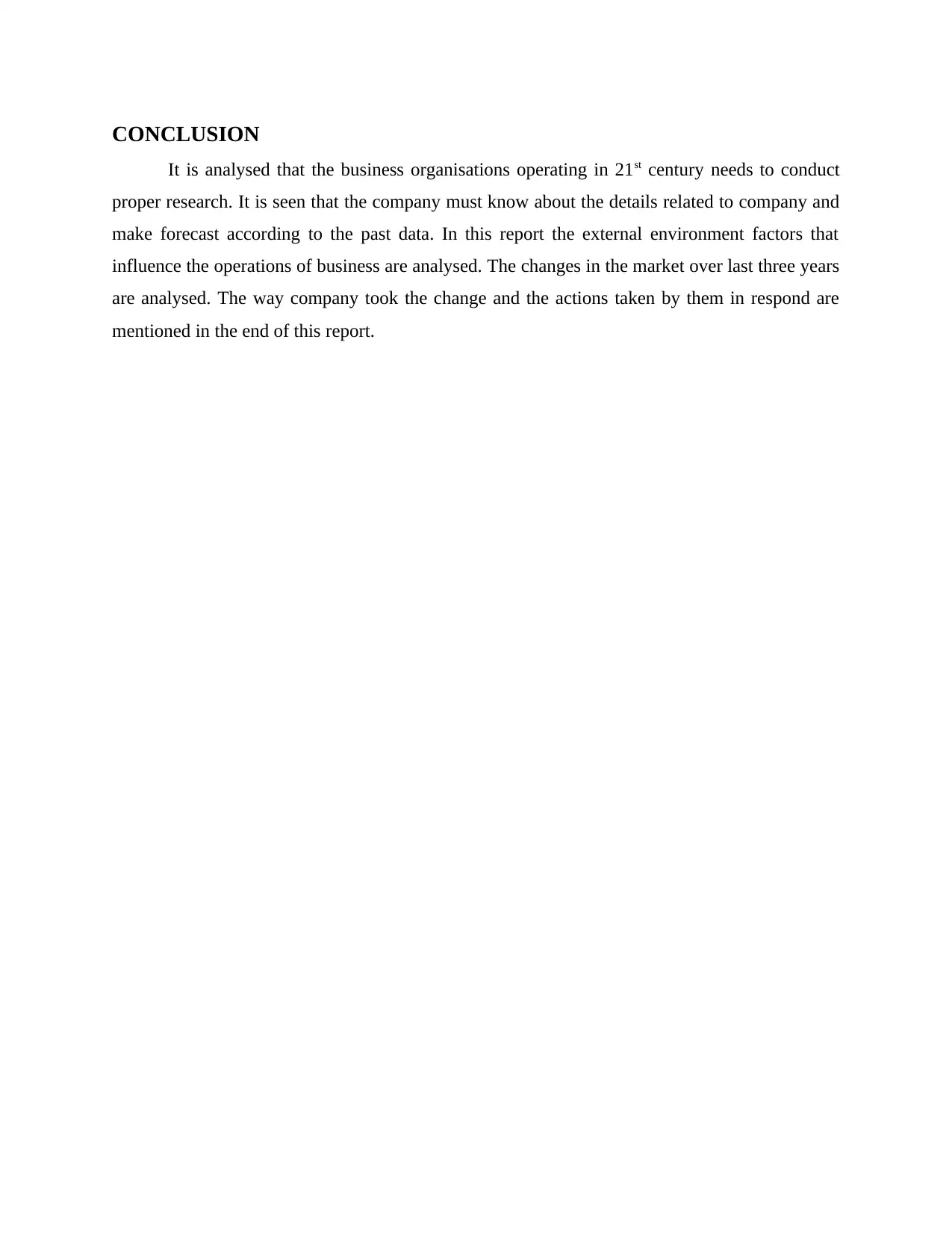
CONCLUSION
It is analysed that the business organisations operating in 21st century needs to conduct
proper research. It is seen that the company must know about the details related to company and
make forecast according to the past data. In this report the external environment factors that
influence the operations of business are analysed. The changes in the market over last three years
are analysed. The way company took the change and the actions taken by them in respond are
mentioned in the end of this report.
It is analysed that the business organisations operating in 21st century needs to conduct
proper research. It is seen that the company must know about the details related to company and
make forecast according to the past data. In this report the external environment factors that
influence the operations of business are analysed. The changes in the market over last three years
are analysed. The way company took the change and the actions taken by them in respond are
mentioned in the end of this report.
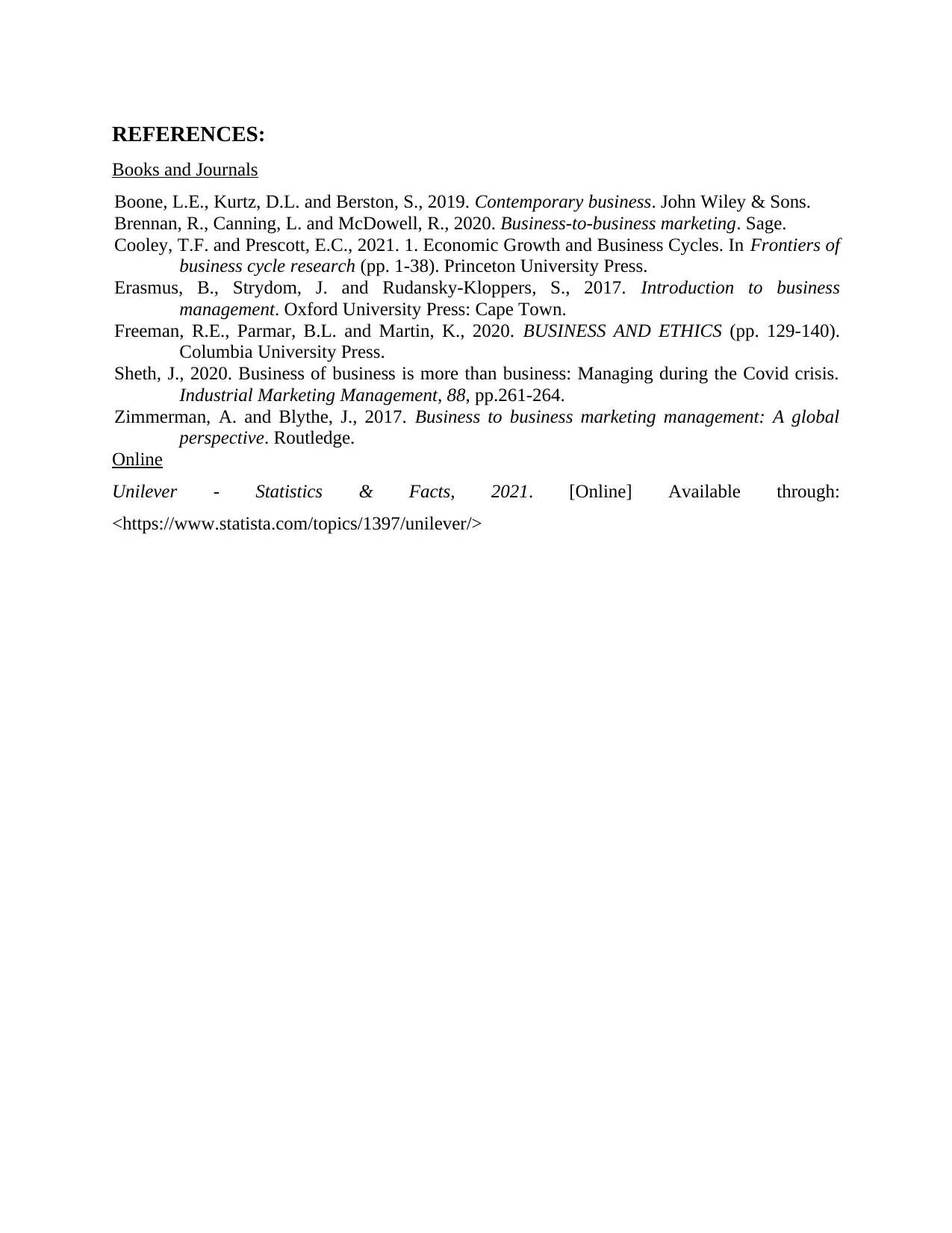
REFERENCES:
Books and Journals
Boone, L.E., Kurtz, D.L. and Berston, S., 2019. Contemporary business. John Wiley & Sons.
Brennan, R., Canning, L. and McDowell, R., 2020. Business-to-business marketing. Sage.
Cooley, T.F. and Prescott, E.C., 2021. 1. Economic Growth and Business Cycles. In Frontiers of
business cycle research (pp. 1-38). Princeton University Press.
Erasmus, B., Strydom, J. and Rudansky-Kloppers, S., 2017. Introduction to business
management. Oxford University Press: Cape Town.
Freeman, R.E., Parmar, B.L. and Martin, K., 2020. BUSINESS AND ETHICS (pp. 129-140).
Columbia University Press.
Sheth, J., 2020. Business of business is more than business: Managing during the Covid crisis.
Industrial Marketing Management, 88, pp.261-264.
Zimmerman, A. and Blythe, J., 2017. Business to business marketing management: A global
perspective. Routledge.
Online
Unilever - Statistics & Facts, 2021. [Online] Available through:
<https://www.statista.com/topics/1397/unilever/>
Books and Journals
Boone, L.E., Kurtz, D.L. and Berston, S., 2019. Contemporary business. John Wiley & Sons.
Brennan, R., Canning, L. and McDowell, R., 2020. Business-to-business marketing. Sage.
Cooley, T.F. and Prescott, E.C., 2021. 1. Economic Growth and Business Cycles. In Frontiers of
business cycle research (pp. 1-38). Princeton University Press.
Erasmus, B., Strydom, J. and Rudansky-Kloppers, S., 2017. Introduction to business
management. Oxford University Press: Cape Town.
Freeman, R.E., Parmar, B.L. and Martin, K., 2020. BUSINESS AND ETHICS (pp. 129-140).
Columbia University Press.
Sheth, J., 2020. Business of business is more than business: Managing during the Covid crisis.
Industrial Marketing Management, 88, pp.261-264.
Zimmerman, A. and Blythe, J., 2017. Business to business marketing management: A global
perspective. Routledge.
Online
Unilever - Statistics & Facts, 2021. [Online] Available through:
<https://www.statista.com/topics/1397/unilever/>
⊘ This is a preview!⊘
Do you want full access?
Subscribe today to unlock all pages.

Trusted by 1+ million students worldwide
1 out of 9
Related Documents
Your All-in-One AI-Powered Toolkit for Academic Success.
+13062052269
info@desklib.com
Available 24*7 on WhatsApp / Email
![[object Object]](/_next/static/media/star-bottom.7253800d.svg)
Unlock your academic potential
Copyright © 2020–2026 A2Z Services. All Rights Reserved. Developed and managed by ZUCOL.





